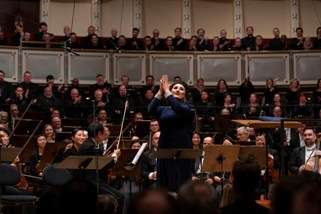|
Back
An Aida Without a Stage Chicago
Symphony Center
06/21/2019 - & June 23, 25, 2019
Giuseppe Verdi: Aida
Krassimira Stoyanova (Aida), Francesco Meli (Radamès), Anita Rachvelishvili (Amneris), Kiril Manolov (Amonasro), Ildar Abdrakazkov (Ramfis), Eric Owens (King), Issachah Savage (Messenger)
Chicago Symphony Chorus, Duaine Wolfe (director), Chicago Symphony Orchestra, Riccardo Muti (conductor)

A. Rachvelishvili (© Todd Rosenberg)
In a season marred by a major strike by the musicians of the vaunted Chicago Symphony, hardly a note of discord emerged in this orchestrally stunning performance of Verdi’s monumental masterpiece. Over the past decade, the CSO’s celebrity conductor Riccardo Muti has led a discreet series of Verdi performances in concert, beginning with Otello in 2011 (performed here and also at New York’s Carnegie Hall) and continuing with Macbeth and Falstaff. A much longer and grander affair, I wondered if Aida really fit within this progression. Its monumental scenes, which incorporate three dance sequences and a triumphal march, among other vast ceremonial scenes, passed rather flatly in an unstaged performance. One wondered if it would have been better for the CSO to collaborate with the Lyric Opera of Chicago and perform in the orchestra pit in support of a proper staging. Still, Muti’s command of his orchestra is unsurpassed, and it was a connoisseur’s delight to hear the score played so attentively under the baton of a true master. Muti has been conducting Aida since 1973 (four years before my birth) and has never ceased to bring something new to it. In his mature years, he showed a tendency to perform slowly, but he nevertheless captured the vibrancy of the work’s more demanding scenes. The Act II Triumph was the best orchestral and choral performance I have ever heard by far. Such moments redeemed the aesthetic merits of his Verdi-in-concert concept, even if three and a half hours in the narrow seats of Chicago’s acoustically divine Symphony Center proved a bit more challenging than the standard two-hour orchestral concert.
With few exceptions, however, it is hard to describe the evening as a great vocal success. Bulgarian soprano Krassimira Stoyanova has had better days. She still possesses a fine pianissimo, which aided her delivery of Aida’s more delicate moments, but the rest of the voice sounded underpowered and hollowed out. We were reminded more of the sunset of a respectable career than the passions of a youthful princess. Francesco Meli did well in the lyrical passages of Radamès’s music, but faltered on the big notes that fall outside his natural range. The B flat that ends the character’s entrance aria “Celeste Aida” notably eluded him. Kiril Manolov’s woolly Amonasro projected little charisma and only really worked in ensembles, the part’s baritonal luster eluding him. Eric Owens’s King of Egypt and Ildar Abdrazakov’s Ramfis – the realm’s mean high priest – were luxuriously cast but I wondered whether the CSO might have presented a Verdi piece that used singers of their talent and stature to greater effect, perhaps in Don Carlo.
It was really only Anita Rachvelishvili’s Amneris that stood out, a continuation of her successes in the role at La Scala and, at the very beginning of this season, at the Metropolitan Opera opposite superstar soprano Anna Netrebko’s Aida. Centered around a sultry middle register and capable of rising to the grandest heights demanded of anyone performing the role today, Rachvelishvili again rose to the challenge. One might consider attending these performances if only to hear her!
Paul du Quenoy
|